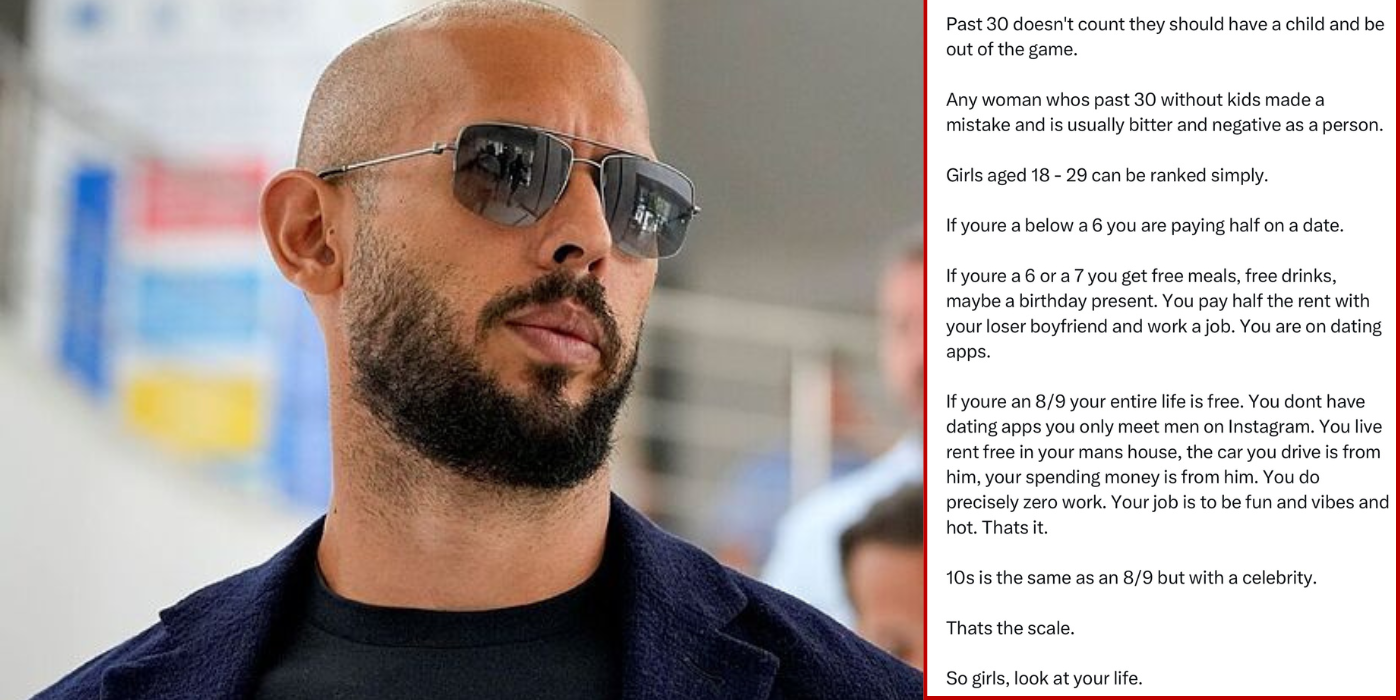

Andrew Tate, a former reality TV personality turned entrepreneur, has caused yet another stir on Twitter, X, with his recent post outlining a controversial ranking system for women.

Andrew Tate, a former reality TV personality turned entrepreneur, has caused a stir on Twitter with his recent post outlining a controversial ranking system for women. In a series of tweets, Tate laid out his criteria for evaluating women's worth based on age and appearance, sparking widespread condemnation and debate.
In the UK, pretty privilege plays out differently for men and women, reflecting societal norms and expectations around gender and appearance. For women, pretty privilege often revolves around fitting into narrow standards of beauty, heavily influenced by Eurocentric features, being slim, or the BBL body standard with celebrity influence such as Kim Kardashian and other well-known influencers and celebrities.
Women who tick these boxes are more likely to get special treatment in various areas of life, like job opportunities, social situations, and how they're shown in the media.
For Black women and women of colour, the pressure to match these standards can be made worse by racial biases and stereotypes, making the gap in beauty standards and opportunities even wider. However, this does differ depending on the context.
On the flip side, while men also feel the heat when it comes to looks, the focus on physical attractiveness isn't usually as intense as it is for women.
Instead, male privilege tends to be more about stuff like height, being muscular, and seeming confident. But let's not forget, these standards can also be influenced by race, with Black men facing their own set of hurdles and stereotypes about masculinity and attractiveness.
Overall, chatting about pretty privilege in the UK shines a light on the complex mix of gender, race, and appearance, showing why it's important to be more aware and inclusive when it comes to defining and challenging beauty standards.
Tate's scale starts with a bold statement, claiming that any woman over 30 who hasn't had children is deemed irrelevant and should be considered out of the dating game. He then divides women aged 18 to 29 into different categories based on their perceived attractiveness and social status.
According to Tate, women who score below a 6 on his scale should be expected to split the bill on dates, while those rated as 6 or 7 may enjoy some perks like free meals and drinks but are still expected to chip in financially to relationships. Women deemed as 8 or 9 are described as living a life of luxury entirely funded by their partners, with no need for dating apps and minimal effort required on their part. Tate reserves the highest ranking, 10, for women who are akin to celebrities in terms of their lifestyle and privileges.


Tate's remarks have unsurprisingly sparked outrage and criticism from many quarters, with accusations of misogyny and objectification of women. Critics argue that reducing women to numerical rankings based on age and appearance is demeaning and perpetuates harmful stereotypes about gender roles and value.
Tate ends his stance, urging women to reflect on their lives in light of his ranking system. However, his comments have only served to fuel further condemnation and calls for accountability.
The controversy surrounding Tate's tweets underscores broader societal debates online in the comments about sexism, ageism, and the objectification of women.